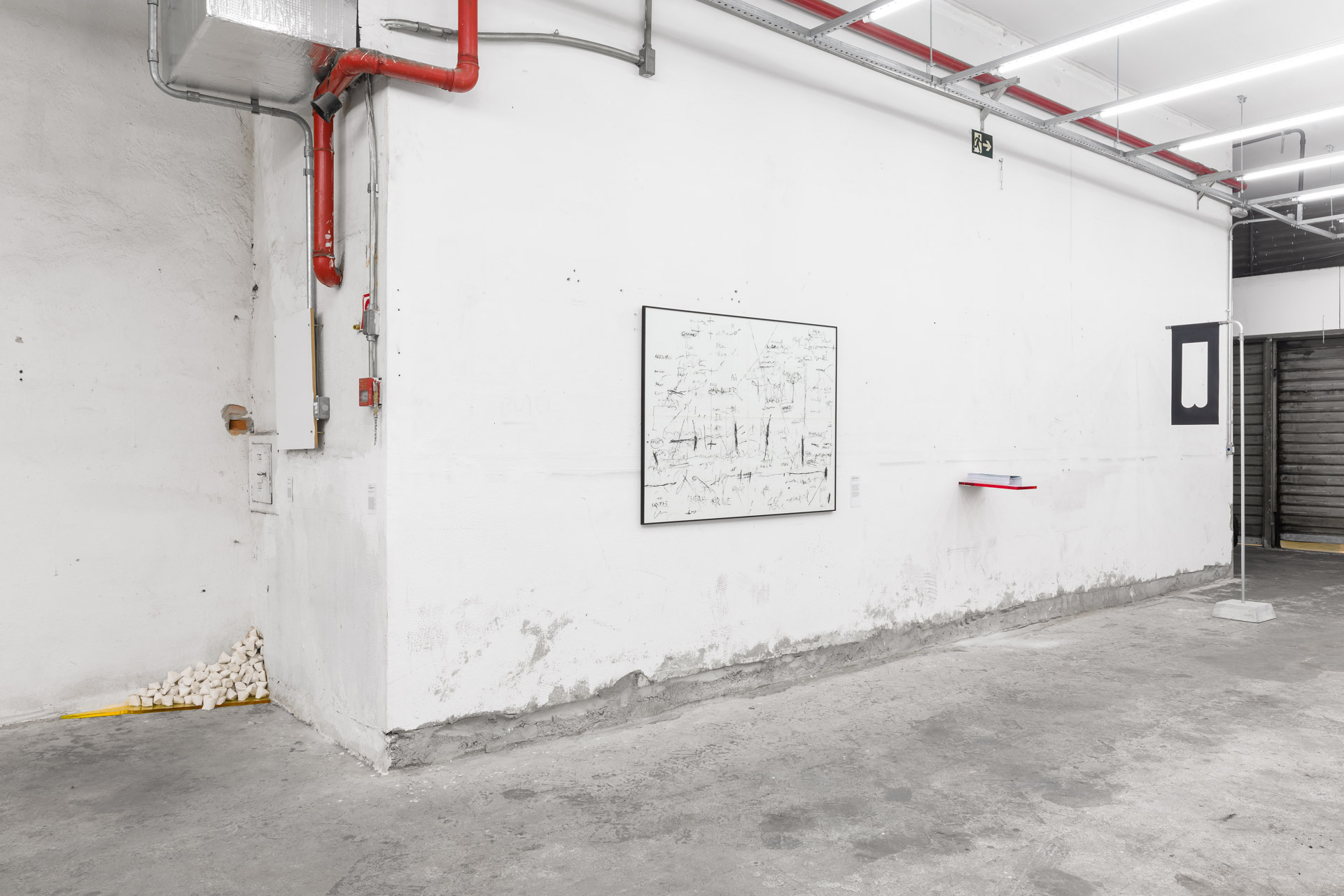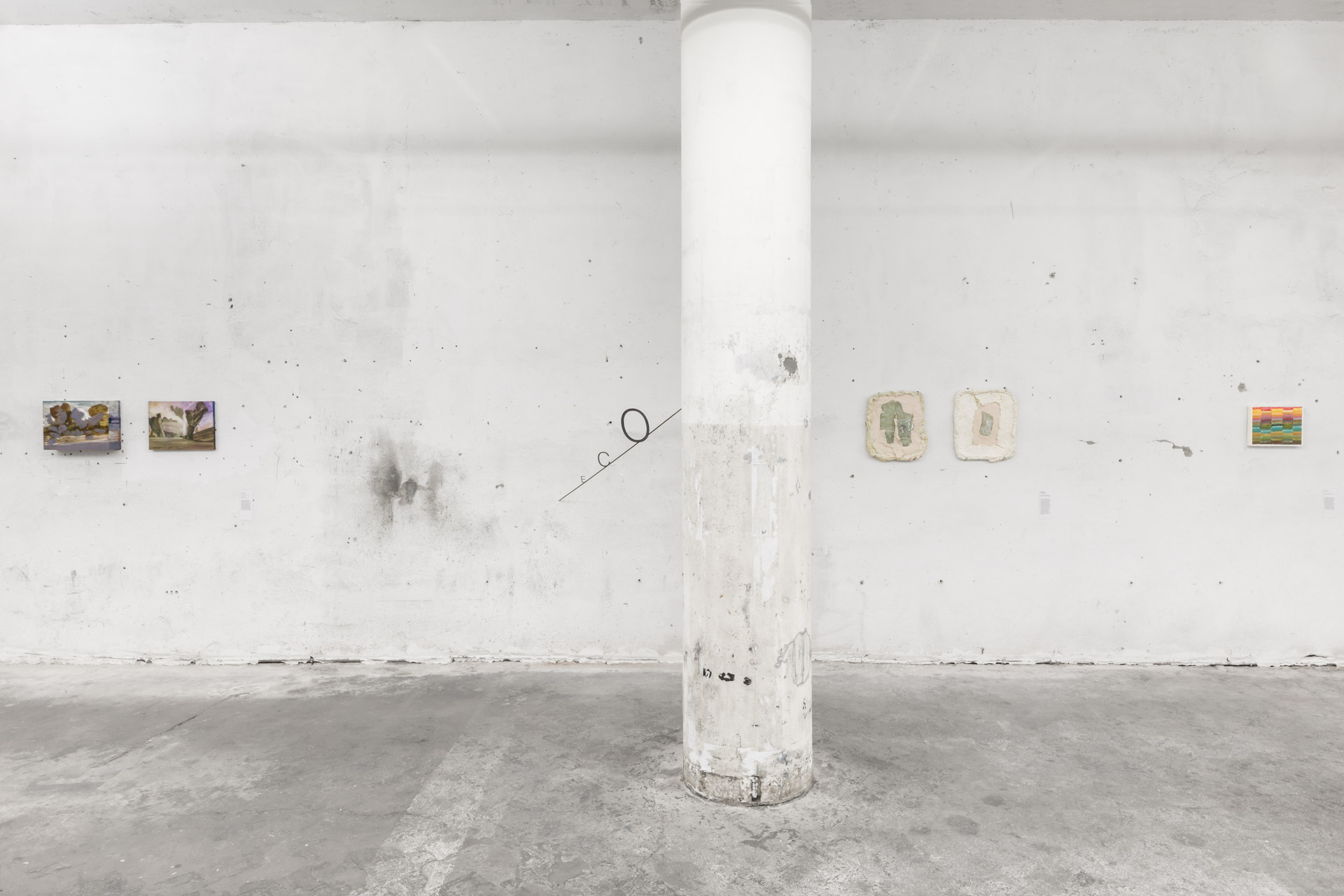Eco Ocê
Quase Espaço, São Paulo, 2024
Curadoria de Marina Schiesari
Quase Espaço, São Paulo, 2024
Curadoria de Marina Schiesari
Eco Ocê
Quase Espaço, São Paulo, 2024.
Curated by Marina Schiesari
Quase Espaço, São Paulo, 2024.
Curated by Marina Schiesari

Alan Oju, Ana Clara Tito, Anália Moraes, Carlos Nunes, Daniel Lima, Desali, Eduardo Montelli, Gi Degiselly, Giselle Beiguelman, Heloisa Franco, Henrique Cutait, Ikaro Cavalcante, Luana Lorena, Lui Beraldo, Manoela Cezar, Maria Lira Marques, Pat Baik, Paulo Nazareth, Rastros de Diógenes, Valentina Tong, Victor Galvão
“Quem está aí?”
“Quem está aí, quem está aí, quem está aí…?”
O grito gradativamente refletia quão exposto se sentia aquele pequeno corpo. ECO, antagonista da conversa, desdobrava para lugar nenhum a reverberação provida. Antes na busca por outrem, agora OCÊ escutava a própria voz esvaziada de sentido.
O tremor de cada passo içava ciscos ao imprimir pegadas. Sensível a tudo, ele seguia em busca de respostas. Vagueava indecisamente: “A causa da tragédia era indetectável, nem sequer constava para qual apocalipse a humanidade havia se preparado. Se fosse bombardeio ou doença, onde estariam os ossos? No caso de água ou erupção, haveria manchas rudimentares nas paredes. Mas não; o fim fora decretado bem antes e estivera presente em todos os diálogos, de geração em geração. Só não se especulava tamanha brutalidade: o corpo humano retirado de cena durante a própria performance”.
À sua volta, sobreviviam pedaços, desdobramentos de resoluções questionáveis e tentativas de recuperação. OCÊ já não se importava mais. Afinal, para onde vai todo o mal quando some o – até então – indispensável? O único bem em observar aquele silêncio estava no impeditivo de desafiar ECO. Deixá-lo intacto significava sair do papel de emissor para se camuflar ao ambiente. Possivelmente, sem tanto duvidar de si, absorveria melhor o lugar.
Finalmente pôde enxergar todos os vestígios tecnológicos, resquícios materiais e elementos primários, cada um manipulado para atender aos desejos existenciais, espirituais e políticos daquela cidadela. A partir disso, OCÊ imagina as histórias e os modos comuns dos ausentes, baseando-se no seu repertório de vivência na Terra. No conjunto daqueles rastros, encontra alguma arqueologia de uma civilização finda, criada a partir da necessidade de existir além do corpo vivo. Talvez esse fosse, de fato, o único motivo pelo qual a costura dessas criações formasse, para ele, uma linha sólida.
Marina Schiesari
“Quem está aí, quem está aí, quem está aí…?”
O grito gradativamente refletia quão exposto se sentia aquele pequeno corpo. ECO, antagonista da conversa, desdobrava para lugar nenhum a reverberação provida. Antes na busca por outrem, agora OCÊ escutava a própria voz esvaziada de sentido.
O tremor de cada passo içava ciscos ao imprimir pegadas. Sensível a tudo, ele seguia em busca de respostas. Vagueava indecisamente: “A causa da tragédia era indetectável, nem sequer constava para qual apocalipse a humanidade havia se preparado. Se fosse bombardeio ou doença, onde estariam os ossos? No caso de água ou erupção, haveria manchas rudimentares nas paredes. Mas não; o fim fora decretado bem antes e estivera presente em todos os diálogos, de geração em geração. Só não se especulava tamanha brutalidade: o corpo humano retirado de cena durante a própria performance”.
À sua volta, sobreviviam pedaços, desdobramentos de resoluções questionáveis e tentativas de recuperação. OCÊ já não se importava mais. Afinal, para onde vai todo o mal quando some o – até então – indispensável? O único bem em observar aquele silêncio estava no impeditivo de desafiar ECO. Deixá-lo intacto significava sair do papel de emissor para se camuflar ao ambiente. Possivelmente, sem tanto duvidar de si, absorveria melhor o lugar.
Finalmente pôde enxergar todos os vestígios tecnológicos, resquícios materiais e elementos primários, cada um manipulado para atender aos desejos existenciais, espirituais e políticos daquela cidadela. A partir disso, OCÊ imagina as histórias e os modos comuns dos ausentes, baseando-se no seu repertório de vivência na Terra. No conjunto daqueles rastros, encontra alguma arqueologia de uma civilização finda, criada a partir da necessidade de existir além do corpo vivo. Talvez esse fosse, de fato, o único motivo pelo qual a costura dessas criações formasse, para ele, uma linha sólida.
Marina Schiesari
"Who's there?"
"Who's there, who's there, who's there...?"
The cry gradually echoed how exposed that small body felt. ECO, the antagonist in the conversation, unfolded the provided reverberation into nowhere. Once in search of another, now OCÊ were hearing your own voice, emptied of meaning.
The trembling of each step stirred up specks of dust as footprints were imprinted. Sensitive to everything, he wandered on in search of answers. He drifted aimlessly: "The cause of the tragedy was undetectable; it wasn’t even clear which apocalypse humanity had prepared for. If it had been a bombing or disease, where were the bones? In the case of water or an eruption, there would be rudimentary stains on the walls. But no—the end had been declared long before and was present in every conversation, passed down from generation to generation. What no one had imagined was such brutality: the human body removed from the scene during its own performance."
Around him, fragments survived—unfoldings of questionable decisions and attempts at recovery. OCÊ no longer cared. After all, where does all the evil go when what was once indispensable disappears The only comfort in observing that silence lay in the inhibition it imposed: it prevented OCÊ from challenging ECO. Leaving it untouched meant stepping out of the role of emitter and blending into the environment. Perhaps, with less self-doubt, OCÊ might absorb the place more fully.
At last, OCÊ could see all the technological traces, material remnants, and primary elements—each manipulated to serve the existential, spiritual, and political desires of that citadel. From this, OCÊ begin to imagine the stories and shared ways of those now absent, drawing on your own repertoire of earthly experience.
Among those traces, OCÊ uncover a kind of archaeology of a lost civilization, born from the need to exist beyond the living body.
Perhaps that was, in fact, the only reason why the stitching of those creations formed, for OCÊ, a solid line.
Marina Schiesari
"Who's there, who's there, who's there...?"
The cry gradually echoed how exposed that small body felt. ECO, the antagonist in the conversation, unfolded the provided reverberation into nowhere. Once in search of another, now OCÊ were hearing your own voice, emptied of meaning.
The trembling of each step stirred up specks of dust as footprints were imprinted. Sensitive to everything, he wandered on in search of answers. He drifted aimlessly: "The cause of the tragedy was undetectable; it wasn’t even clear which apocalypse humanity had prepared for. If it had been a bombing or disease, where were the bones? In the case of water or an eruption, there would be rudimentary stains on the walls. But no—the end had been declared long before and was present in every conversation, passed down from generation to generation. What no one had imagined was such brutality: the human body removed from the scene during its own performance."
Around him, fragments survived—unfoldings of questionable decisions and attempts at recovery. OCÊ no longer cared. After all, where does all the evil go when what was once indispensable disappears The only comfort in observing that silence lay in the inhibition it imposed: it prevented OCÊ from challenging ECO. Leaving it untouched meant stepping out of the role of emitter and blending into the environment. Perhaps, with less self-doubt, OCÊ might absorb the place more fully.
At last, OCÊ could see all the technological traces, material remnants, and primary elements—each manipulated to serve the existential, spiritual, and political desires of that citadel. From this, OCÊ begin to imagine the stories and shared ways of those now absent, drawing on your own repertoire of earthly experience.
Among those traces, OCÊ uncover a kind of archaeology of a lost civilization, born from the need to exist beyond the living body.
Perhaps that was, in fact, the only reason why the stitching of those creations formed, for OCÊ, a solid line.
Marina Schiesari
Vistas da instalação
Installation views




Watch full video here:
Vistas da exposição
Exhibition views




Foto: Estúdio em Obra